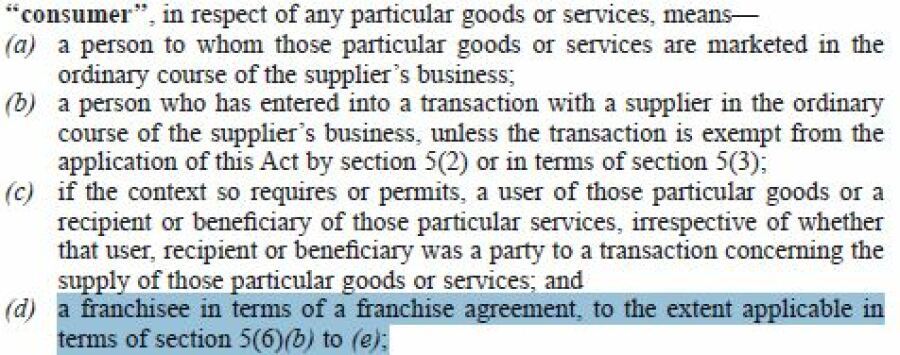It’s curious to think of franchisees as consumers. As a franchisee you are a business owner and emphasis is placed on finding and serving customers, not being one. Obviously anyone who runs a company will need to buy the professional essentials such as pens and hot chocolate, but it’s different to picture an investment in a franchise as a full out purchase.
The Consumer Protection Act 2008
Luckily that is how it is seen by the Franchise Association of South Africa (FASA), an organisation dedicated to ethical franchising and improving the sector, who worked hard a few years ago to make sure that franchisees were included in the Consumer Protection Act 2008. This legislation came into effect in 2011:

The Act also includes a 179 word definition of a franchise agreement, before declaring later on that the agreement “must be regarded as a transaction between a supplier and a consumer.” Such inclusions mean that franchisees are protected by law as much as any other consumer, except in a few areas such as the consumer’s right to cancel an advanced reservation/order; over-booking; and catalogue marketing, which do not apply to the franchise agreement.
FASA as the Alternative Dispute Resolution Body
If franchisees feel that a franchisor has not respected their rights – for example, another outlet has been set up within their assigned territory – they are entitled to do something about it. However, to do so they must currently go to a lawyer or to the National Consumer Commission and both of these moves take time and can be expensive. FASA are receiving an increasing number of contacts from disgruntled franchisees, but the association only grant their expert mediation services if the franchise company involved is one of their members.
FASA are cautious about granting membership, only doing so after “a thorough assessment of each applicant company.” Current/potential franchise company membership starts at R9,633 per annum as well as a once-off legal fee of R3,160. It is estimated that only 25% of the businesses in South Africa claiming to be franchises are FASA members at this time.

FASA have been a voluntary association for 34 years, but they now hope to gain statutory powers by becoming the Alternate Dispute Resolution (ADR) arm of the Consumer Protection Commission, covering the franchise sector. This would mean that any franchising industry disagreements the Commission receives would be officially referred to FASA, who would deal with both parties even if they were not FASA members, acting as referee and helping them to resolve. This would help to consolidate the industry.
It is not going to happen immediately. FASA have actually been speaking of applying to the Commission all year, but at the time of publishing have yet to do so. “They have indicated in the past that they would want to have an accredited code,” says Andy Thupayatlase from the National Consumer Commission’s legal division. “The question is whether they have actually brought an application for such accreditation, and the answer is no.” FASA assure us that they are “in the process of finalising” their application, and hope to have it sent in by next year.
FASA find that their lack of authority makes all attempts to regulate and enforce their code of ethics “an uphill battle.” Furthermore, they also need to register as a professional body with the Services Seta, as well as apply for professional status with the South African Qualifications Authority. We wish them the best of luck.














